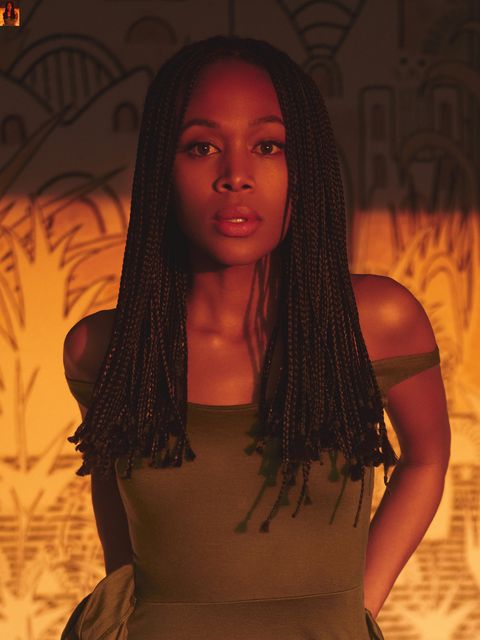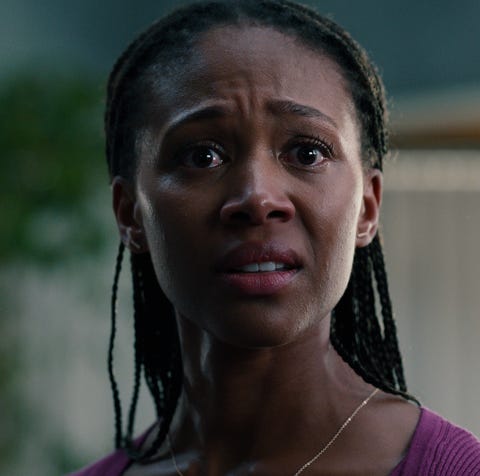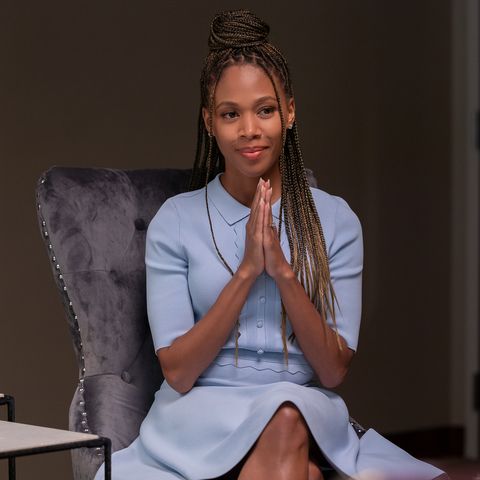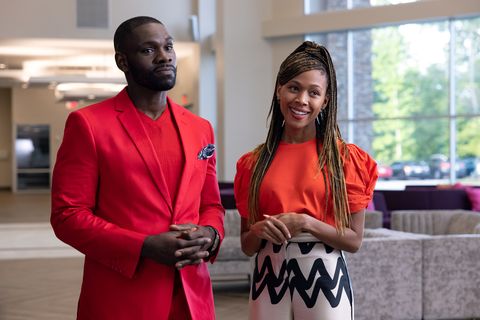Products You May Like
Nicole Beharie is having a moment. The Florida native and Juilliard grad has two critically acclaimed films out, which arrived on back-to-back weekends, showing very different but equally impressive performances: one as bank robbery hostage Estel Valerie in Breaking and the other as rival megachurch pastor Shakura Sumpter in Honk for Jesus. Save Your Soul. Her starring role in the forthcoming season of Apple TV+’s The Morning Show was also announced soon after she spoke down with ELLE.com, to the delight of everyone who’s been following her career since the early 2010s. The wide range of roles Beharie has played makes following her career an exciting journey, one she’s crafted by design.
“I don’t wanna restrict myself to any one particular thing,” she says during a Zoom interview, which is camera-off as she’s in the middle of a move and taking down her braids. “It’s also for people who are fans or like, ‘Hey, I like to see movies with you in it.’ I want them to have a variety of things to look forward to like, ‘Oh, Nicole’s gonna do something. Let’s see what this is gonna be this time.’” What she loves about choosing her projects is the unpredictability, “creating a little bit of a surprise.”
Beharie could be considered one of the Internet’s favorite actresses, as she regularly goes viral for a three-year old performance, distilled into an under-a-minute clip. In the Black Mirror scene, she plays a wife whose husband has neglected her in a heightened sci-fi circumstance, and she’s asking him what’s changed. There’s vulnerability in every expression. It’s not covered up by the character’s anger and attempts at composure; instead it melds with it. It’s a stunning clip, but Beharie doesn’t attribute its popularity to her acting.
“It might be that people connect with the character, with not feeling heard and completely loved in the way that they expected. Maybe more people connect to what she’s really going through than they would like to admit.”
There are several moments like this throughout our interview, when Beharie distills a common truth about human nature into such a simple explanation, my brain spins a bit too fast trying to keep up. The only throughline that rivals this experience is her effusive shout-outs to her collaborators, from her Black Mirror partner Anthony Mackie (“a superhero in real life and for Marvel”) to her Honk for Jesus husband Conphidance (“full-on fun energy”) and her Breaking co-stars John Boyega (“he shows up and really shows out”) and the late Michael K. Williams (“a gift on set”).
Though Beharie couldn’t mention her Morning Show gig during the chat, she hinted that big things are coming down the line, including “some musical stuff [and] some TV projects.” Following her Gotham Independent Film Award-winning performance in Miss Juneteenth, the heads of Hollywood seem to be catching up with fans who’ve seen Beharie as the star she is for a decade. The actress also makes sure to show her gratitude to the viewers who keep that Black Mirror clip in rotation.
“I appreciate the people who are rocking with me like that, and I hope this sincerely—it’s funny cause I feel it coming from my belly—I hope that the things that I have coming up and the things that I have planned surprise and excite them,” she says.
Below, Beharie speaks with ELLE.com about the societal messages behind her two new films, the intricacies of her performances, and the genres she wants to perform in the future.
Breaking and Honk for Jesus are two very different projects, but both tell stories that have been under explored in film and need to be told. Was that part of your thought process in choosing these roles?
I’m gonna say yes, cause it sounds good the way you said it. That and the people involved, their intentions behind making the pieces, really aligned and connected with me. Whether it’s Adamma [Ebo, writer-director of Honk of Jesus] or Abi [Damaris Corbin, director of Breaking]. In both pictures, like you said, [these stories are] rarely told in this particular way. With Breaking, we’ve seen a lot of war movies, or even heist movies, that are sort of glorifications of the violence or being in the service, et cetera. I think with this particular piece, you’re seeing what the ramifications are on the other side of it or what they can be and how people are or are not taken care of. Also, how do the citizens around [them] deal with this world that we’re left with after someone goes and serves in the military and then doesn’t necessarily have the support that you would imagine is just built into the system?
In something like Honk for Jesus, whether it’s the Catholic church or whatever church you’re talking about, there’s always murmurings, whispers, questions of what’s happening with the money. Just so many things there that are taboo in the Black community and in every community. I think it’s amazing and super risky that Adamma wanted to lean into that in the same vein of the really popular Christopher Guest documentaries, like Best In Show. Those are all things that I was like, I’ve seen a lot of war films, but I haven’t seen this thing. I’ve seen documentaries or I’ve seen stories about churches, but not in this way. So yeah, that’s what pulled me in.
I was especially interested in your performance for Breaking because Estel is very calm under pressure, but there are moments where you can see the underlying panic break through. When you were building the character, did you have certain beats or points within the standoff let the fear come out a little bit more?
There’s a moment when she is communicating with her child that I really understood, where you don’t say, “I don’t know if I’m gonna be coming home tonight,” but you realize that you’re in a predicament. That’s one of the moments, and here’s the thing, it’s a brilliant script. So it’s also scripted. It wasn’t like I had to concoct it myself. We were all in this one space; the set is basically a bank and that’s where everything takes place. So in this one space, it was our job to make sure that we’re creating an interesting and realistic ride for the audience, while also giving respect to what actually happened, because this is based on a true story about Brian Easley-Brown, right. The woman I play, her name is Estel in the picture, but she’s not a made-up character. This is a person who actually helped get people out and stayed in the bank. Let me tell you, I’m not heroic like that. There’s so many times I was like, why doesn’t she run? Why don’t I run? It was having to tap into that. That was really huge for me.
Yours and Michael K. Williams’ characters are both negotiators in the sense that they are on Brian’s side and want to get him out of there alive. Were there any personal emotions that you tapped into within trying to help someone get out of an impossible situation?
If I’m gonna be honest and really share with you, I have an uncle who was in the service and came back different than when he left. Maybe not to the extent of Brian, but he didn’t maybe have the same glint in his eye or memory, a little erratic here and there, just different things. I feel like as a family, even, or for myself, we may have dropped the ball in ways with getting him the proper care initially. In the end it happened. Being in this project is also coming from the heart in that way, wanting for the story to be heard, so there can be more conversations about what is going on with veterans. Just in the past few weeks, there have been referendums and changes to the healthcare processes for people who are returning after being on duty, and not in a positive way. It’s been decreased and they have to have more proof that there’s been injuries or exposure to pollutants and all that sort of thing. I think it really aligns with the timing of the film. So hopefully this will spur some conversation and maybe some action.
For your character Shakura Sumpter in Honk for Jesus, I wanted to ask about her having a different stance from [Regina Hall’s character] Trinitee, wherein Shakura is a co-pastor versus a pastor’s wife.
Yeah. She’s the new generation of the churches that we’re seeing, where it’s not just the male-dominated pulpit anymore. She can be there and even be a co-pastor, but sometimes she’s running a whole service. The community is ready for that change, especially because the other way, in some ways, wasn’t working. I think that that’s what’s really exciting, and it’s also reflective of what’s happening in Christian-dom. Over the pandemic, I was able to watch a lot of church online to research for this because people were doing their services via Zoom or on YouTube. I was just seeing a lot of that representation for women in the pulpit, and I think that makes a lot of sense.
With Trinitee, she’s got a really old-fashioned setup, but you can feel a longing in her for more. You can feel the level of responsibility and burden that she has where she’s doing just as much, but not getting that respect in the same way. That difference between them is really interesting.
Would you like to do more comedy like Honk for Jesus in the future?
Absolutely. I would love to do more comedy, with the right project. I really love a lot of different types of genres, and there’s so much interesting content happening right now, too. I love sci-fi and fantasy.
I have to ask, especially since you brought up sci-fi. I’m not sure if you’re at all active on Twitter, but every couple months or so, your monologue from your episode of Black Mirror will pop up, and it’s always a love fest. I was wondering if you had ever seen any of that.
I saw some people reposting that scene this past year, and I was like, “Okay, cool.” Then someone else told me that. I feel like there’s just a super-fan out there somewhere, I don’t know. It’s surprising, like there’s so much content out there. There’s so many amazing scenes happening in the world, so I’m honored. I just have to say that, cause it is kinda like really, wow.
I think it’s also because it was such a different story for us, even in the same way as Honk for Jesus. It’s taboo. We’re now seeing more content about Black-on-Black male love, or even being in like a Metaverse, but we had never seen anything like that before this episode. I think it’s more than what I did necessarily, it was a coming together of a bunch of different things that made it pop.
It might also be that people connect with the character, with not feeling heard and completely loved in the way that they expected. Maybe more people than they would like to admit, when everyone’s posting these fantastic photos of their trips and their great relationships. Maybe more people connect to what she’s really going through than they would like to admit. It’s really honest. Anthony [Mackie] and I, we definitely worked from a really honest place.
Considering your very expansive career with all of these like different roles and experiences, is there one role or set experience that you remember fondly or that sticks out?
That’s tough because they’ve all been very different, and I’ve enjoyed them and hated them for different reasons like any job. The first thing that comes to mind is being in Breaking, getting to cross paths with someone like Michael [K. Williams], and seeing what a gift he was on set and how generous he was. He came in to do my off-camera phone call when he had a day off. This is a star. He doesn’t have to do that for our indie. He came in, and that speaks to his spirit. So seeing that and learning from that, and just knowing that that is one of his last pictures. In this moment right now, the first thing that comes to mind is like, wow. That’s a responsibility and that’s really powerful and very odd and sad. I got to work with him not knowing that this would be what it is. I couldn’t do an interview and not mention what an honor it was to work with him.
I know there are things that I’m looking forward to. There’s some musical stuff going on. There’s some TV projects coming on. So I’m hoping that I’m gonna be creating more opportunities for others and also for myself, where I’ll get back to you on that question and be like, “It was this one.” Just to have a little bit more fun and create a little bit more of that dream space that I like to create. I hope that answers it.
This interview has been edited and condensed for clarity.
Quinci LeGardye is an LA-based freelance writer who covers culture, politics, and mental health through a Black feminist lens. When she isn’t writing or checking Twitter, she’s probably watching the latest K-drama or giving a concert performance in her car.



